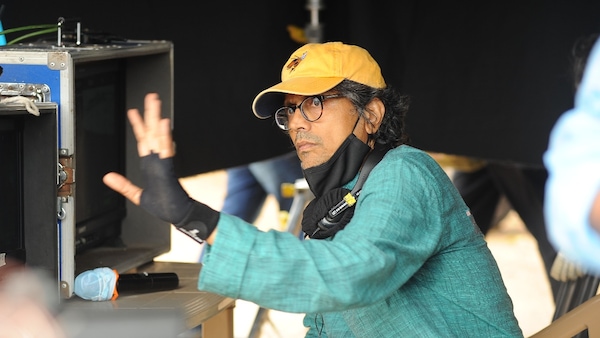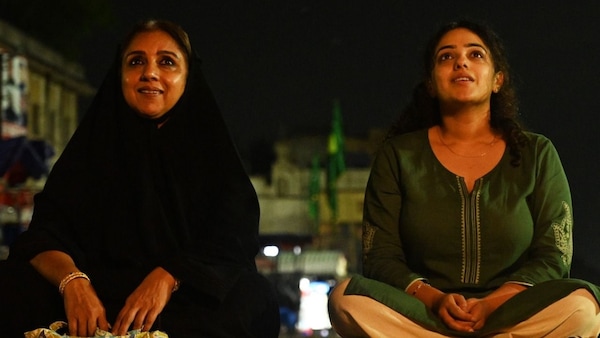Exclusive! Nagesh Kukunoor on Modern Love Hyderabad: Being a showrunner, I had to step back and act like a non-interfering dad
The Hyderabad Blues director, who’s not new to the digital space, discusses his takeaways from the Modern Love Hyderabad experience, his love-hate relationship with Hyderabad and the challenges of being a showrunner

Last Updated: 01.18 PM, Jul 12, 2022
Nagesh Kukunoor is one of the very few filmmakers in the business who still stays true to the very reason he entered the industry - to find joy in what he makes. Miraculously, he has guarded himself from industry practices corrupting his directorial voice. The rise of the digital medium is probably the best thing to have happened to his career – ‘niche’ is no longer a bad word in the industry.
“If I have it my way, I’d make content only for streaming platforms all my life,” he says. Though the Iqbal, Hyderabad Blues director has been in the digital space for nearly five years now, Amazon Prime Video’s anthology Modern Love Hyderabad gave him an added responsibility as a ‘showrunner’ (in addition to directing three films as part of it).
In a chat with OTTplay.com, he discusses his equation with Hyderabad, the portrayal of ‘everyday mundaneness’ in his films, learnings from the OTT world, writing stories that would be directed by other filmmakers and the takeaways from the Modern Love Hyderabad experience.
You share an interesting love-hate relationship with Hyderabad. You left Hyderabad to head to the US, returned to make Hyderabad Blues, and went on to make a career in Mumbai but you’re still around in the city once in a while.
You’re right! When I left for Georgia in 1988, I thought I wouldn’t return to India, forget Hyderabad! The movie bug brought me back here and because I’ve been making films regularly in Hindi, I shifted to Mumbai. The truth of the matter is that all my friends and parents are still in Hyderabad. In the last 5-7 years, I’ve been to the city at least twice a month. I’m not living in Hyderabad but I’m technically there to feel the vibe, the changes in the city. It’s a different case when you’re shooting in Hyderabad because you start exploring the city more. Even though I’m Hyderabadi, the city stops for me at Banjara Hills. Everything past that is a new city I’m not familiar with. This time, I had to shut up (laughs) and capture the spirit of the city in its entirety.
The world has always known you as a writer and a director but in the case of Modern Love Hyderabad, you’re a showrunner and responsible for the content that someone else makes too. From what we know of you, it must not have come to you naturally...
You’ve hit me at the awkward spot (laughs). Most established filmmakers have various assistants and associates working with them to create content. In my case, I realised early that filmmaking (in which writing plays a huge part) is an extremely selfish process. I do it because I enjoy the process of writing something and bringing it to the screen. Being a showrunner was an alien experience.
I was to direct only two of the four shorts in the anthology and I had to take on another because I couldn’t find the right filmmaker. Being a showrunner, there’s separation anxiety but letting it go is beautiful. You see some things you never saw. Venkatesh Maha, Devika Bahudhanam and Uday Gurrala did a good job but Uday’s interpretation of my material caught me off-guard. Honestly, he did a better job than what I would’ve done. It’s a huge learning experience.
The number game you went through during the making of Modern Love Hyderabad is indeed crazy. Having to go through 200 stories from the NYTimes column, picking 25 from them and bringing the number down to 6 - was it madness?
It’s an awful process. Firstly, it’s being curated by New York Times - arguably, one of the finest newspapers in the world. The kind of stories they finally give a nod to is not everyday mundane stuff. It was a challenge to finalise what to let go of and what to keep. Ultimately, our job was to pick six stories that would appeal to the Telugu audience. If I was left to my choices, the likelihood of me picking something else also existed. We had a panel that was helping us through the process, making instinctive choices but also keeping the audience in mind. I’ve rarely done something like this because I’ve never worried about my audiences whenever I’ve set out to make something. This was different.
In all your three shorts - My Unlikely Pandemic Dream Partner, Fuzzy, Purple And Full Of Thorns & Why Did She Leave Me There…? – what’s most heart-warming is your portrayal of everyday mundaneness and how you find beauty within the daily rush. That has been your USP as a storyteller for a major part of your career too.
Early on in my career, I realised that the minutiae of everyday life interests me a lot and I don’t say this presuming that I’m a so-called art-film director. I find every day, mundane life incredibly fascinating. Let me also say that every film a director sets out to make is a point of view. Had Hyderabad Blues not worked, maybe I would’ve dealt with broad strokes, big drama and not minutiae. When Hyderabad Blues found resonance, I made it a point to stick to my gut instinct and that’s what I’ve done all through my career.
Fuzzy, Purple And Full Of Thorns was the most interesting among your shorts, given how it wasn’t the easiest of stories to interpret for the screen. It was also the first time you used animation as a storytelling tool and you still made it look like a natural extension of Ritu Varma’s character.
The idea to use animation came from my co-writer Sashi Sudigala. The moment he suggested that, I thought it was fabulous. I always get excited if it’s something I haven’t done before. I thought it was a great weapon, owing to the nature of the story. It’s one story that’s out of my safety zone. Even in the way I made Ritu act, I got her to play it very high to go hand in glove with the cartoon character she was drawing.
In my mind, I felt this wasn’t ringing through but it still works perfectly for this universe. In an earlier draft of my script, the couple makes love after the rough patch in the relationship but given the format of the show, it wasn’t practical. Now, we cut to an animation sequence to show them shedding their clothes and making out - I had the time of my life designing those wacky shots. It was joyous and I enjoyed working with both the actors in the short.
Tell us about exploring the awkward dynamic between a mother and a daughter in My Unlikely Pandemic Dream Partner. The relationship goes through many rough patches but you still managed to capture the warmth between them.
For that short, the original story, written in the NYTimes, already suggested that the relationship between the mother and daughter was fractured. It gave me the foundation to delve deep into it. The co-writer Bahaish and I built a backstory to suggest why their relationship was fractured. Once two people are in a situation beyond their control, they’re forced to play out of their comfort zone.
The opportunities to engage with the conflict were abundant - the key thing I focused on (and one that’s always part of my writing) is that I feel my audience has to discover something new that they didn’t know before in every scene. While the characters discover that themselves, the audience has to discover it too. I thought we did a solid job about how the information is given to the audiences gradually, including the last sequence where you take a while to know why they ended up at Charminar. The mother, when she reveals the reason behind it, truly suggests that she wants to mend the equation with her daughter (her husband had also dreamt that). As writers, you borrow from your own experiences on a subconscious level.

Food plays the ice-breaker in their relationship in the film. How does one make food look appetising on the screen without going overboard?
Every time someone talks about Hyderabad, food is one thing that comes to their mind. I know that Hyderabad Dum Biryani is a cliche and I’m okay with it. Food is known to be an integral dimension of the city and I was dying to bring it out through a story. I was particular that the food segments in the short didn’t look like an advertisement. In an ad world, one brings a food stylist, the cinematographer falls in love with the way the food is visualised and everyone pats each other’s back at the end of the day.
My idea was to make food appealing very authentically without employing stereotypes. As a matter of fact, I told my cinematographer Sangram Giri to not glamourise it. ‘Make it look appealing but it has to stay the way it’s on someone’s table’ was what I exactly said. I think we did a good job. On set, it was such a blast and we had an amazing cook called Anjum driving us bananas on sets. Whenever we called cut, everyone pounced on the food. It was a joyous shoot.
Some of the best works in your career were a result of the creative independence that you enjoyed as a filmmaker. With the corporate structure increasingly coming in the way of how content is interpreted on the screen, is it challenging to find your voice as a storyteller these days?
I completely agree with what you say. However, the rules that hamper the making of a web show or a feature film are beyond them too. With Amazon, it was a convenient, easy association but we live in a world where everyone is terrified of every word we utter on screen. Having been in the OTT space for five years now, I can say everyone is on guard all the time. It certainly affects storytellers but I don’t think the issue is specific to OTT platforms alone. Everyone is on tenterhooks; people are filing lawsuits at the drop of a hat. Now that I’ve been in the digital space for a while now, the situation is comfortable. What else can you do except abide by the rules?
What are your major takeaways from the Modern Love Hyderabad experience?
Personally, it was a satisfying experience. You know the reasons - adapting the material that’s not mine, building on it, giving it to other directors, having to step back and act like a non-interfering dad and working in a Telugu environment that’s still new to me. I am reaching out to a new audience. My own stories gave me the associate with A-list talent, and portray three different relationships. It was just one season but the learning curve was huge. I had fun and I hope audiences experience that too.
Subscribe to our newsletter for top content, delivered fast.

